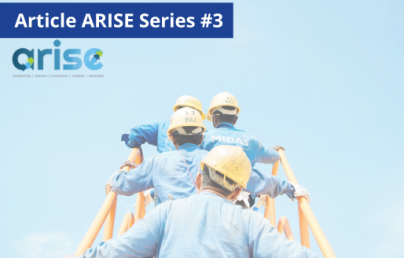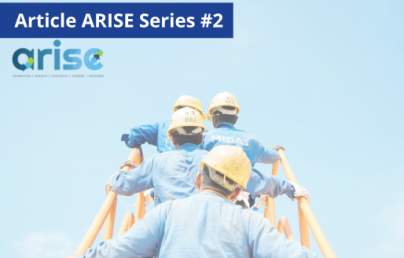Article | The Currency of Skills # 4: Lifelong Learning

Article | The Currency of Skills # 4: Lifelong Learning
Authors:
Jan Cromwijk ISSO | LinkedIn and X Profile.
Jaap Kolk Building Changes | LinkedIn Profile.
Paul McCormack ARISE, Innovation Manager at Belfast Metropolitan College. | LinkedIn and X profile.
(Note: opinions in the articles are of the authors only and do not necessarily reflect the opinion of the EU).
Introduction
Why is lifelong learning the ultimate investment in your future? With industrial change accelerating in today's rapidly changing world, industries and especially the construction sector are constantly evolving, new technologies are emerging at an unprecedented rate although their potential value often stays a potential. This means that with the skills of today we cannot create the added value made possible by innovations tomorrow. To create added value with new technologies, in order to ride the wave of change, and become sustainable and long-term profitable, it is essential to embrace lifelong learning. Lifelong learning allows us to adapt to new trends, acquire new skills, and reinvent our primary processes and business models.
Moreover, lifelong learning is not limited to our professional lives. It also enhances our personal development and enriches our lives. It opens doors to new opportunities, broadens our perspectives, and enables us to become well-rounded individuals. Lifelong learning fosters curiosity, critical thinking, and creativity, enabling us to navigate through life's challenges with confidence and resilience.
Skills inflation
The currency of skills emphasises the need for continuous learning and upskilling throughout one's life. In a rapidly changing world, skills can quickly become outdated and are, just as money, subject to inflation. Therefore, individuals must be proactive in investing in acquiring new skills and adapting to evolving industry trends and technologies. Lifelong learning allows individuals to stay relevant, remain competitive in the job market, and take advantage of emerging opportunities.
Also, with increasing labour shortages and with the twin transition (on energy and digitalisation) in mind, organisations need to be able to attract and keep skilled personnel. Their focus needs to shift from deploying human resources to employing human capital. This requires a strategy where organisations invest in a future-proof, skilled workforce. A workforce where previously acquired skills are valued and where acquiring new skills is promoted in combination with providing application space for those new skills by properly phasing out old businesses and building up new ones.
Lifelong learning skills are the abilities and attributes that enable individuals to engage in continuous learning and acquire new knowledge, skills, and competencies throughout their lives. Lifelong learning is essential in today's rapidly changing world, where new technologies, industries, and job requirements constantly emerge.
Developing lifelong learning skills empowers individuals to adapt, thrive, and succeed in an ever-changing world. By embracing lifelong learning, individuals can continuously acquire new knowledge, adapt to new challenges, and pursue personal and professional growth throughout their lives.
Monetary skills
Just like a coin not only has a monetary value, being part of a currency represents a value. So does lifelong learning not only represent skill development, it is also a skill in itself. Individuals who engage in lifelong learning have higher cognitive and memory levels and have better mental robustness through a sense of purpose and the feeling of competency.
Throughout Europe, countries are increasing their effort on deploying human capital agendas, assisting the learner to build skills portfolios and to ensure these skills address the needs of the economy. Although these agendas are deployed on a regional and national level, the EU LIFE project BUILD UP (The European portal for energy efficiency and renewable energy in buildings) aims to coordinate a common development. One of the results is national roadmaps on how skills will evolve in the coming years. These roadmaps will help organisations and individuals to strategize on their own lifelong learning and ensure that their investment in skills is well-informed to deliver the highest rates of return.
The benefits of investing in skills through lifelong learning
Investing in skills through lifelong learning has a multitude of benefits.
It increases employability. Smart employers value individuals who are committed to self-improvement and actively seek opportunities to learn and grow. Lifelong learners are more versatile, adaptable, and capable of taking on new challenges. Especially when employers provide proper incubator space where those challenges can be pinpointed, tackled and translated into new primary processes.
Lifelong learning enhances our earning potential. By continuously upgrading our skills, we become more valuable assets to employers and clients. This positions us for higher-paying job opportunities and the possibility of career advancement.
Lifelong learning promotes personal growth and self-fulfilment. It allows the learner to explore our passions, discover new interests, and pursue meaningful endeavours. Learning new skills also boosts self-confidence, as we become more competent in various areas of our lives.
Investing in agile education for lifelong learning
While formal learning resources are abundant, lots of learning activities are not properly rewarded. It is acknowledged that formal education still holds immense value in lifelong learning; it has to be supported with task-based = online learning modules to enable 24/7 access from all sectors of the workforce. The ARISE project is revolutionising the learning process by monetizing the skills and learning exchange with a system based on skills recognition rather than accreditation. The methodology uses gamification and is inspiring demand for sustainable energy skills, by providing clear learning interactions, transparency of upskilling transactions and recognition of qualifications achieved.
This agile route to continuous learning harnasses micro-learning and micro-credentials as the basis for making learning transactions count. The project links digital modules, tools and materials with the aim of establishing a digital resource and skills recognition pathway that all stakeholders can utilise, deliver and stimulate. The learners develop their own skills pathways and accrue a collection of digital badges fit for use in skills portfolios/skills passports and thus increasing vocational mobility.
Skills investments
In our modern skills-based economy, skills are often equated to currency, representing valuable assets that individuals possess and can leverage to generate income and opportunities. Just as currency fluctuates in value, the value of skills can vary based on market demand, technological advancements, and economic trends. Real competitiveness arises from individuals who invest in acquiring and honing skills to increase their marketability and adaptability in the ever-evolving labour market.
Just as investors speculate on the future value of financial assets, individuals invest in skills development with the expectation of enhancing their earning potential and career prospects in the future. Skills futures represent the anticipated value and potential growth of an individual's skills over time. Just as financial assets are valued through various methods, such as discounted cash flow analysis, skills valuation may incorporate metrics like earning potential, industry certifications, and performance metrics.
Skills valuation enables industry and individuals to assess the market value of specific skills based on factors such as supply and demand dynamics, industry trends, and the level of expertise required and as a result look to which part of the economy will give them a better return on their investments. Through using and integrating financial and economic concepts, we can start to value the analogy of skills as currency, and how the use of the term provides a nuanced understanding of the importance of lifelong learning and skills development in navigating the dynamic landscape of the modern economy.
Conclusion
Lifelong learning is not just a buzzword; it is a mindset and a commitment to continuous growth and improvement. By investing in our skills through lifelong learning, we position ourselves for success in a rapidly changing world. Lifelong learning enhances employability, earning potential, and personal development. It equips the learner with the knowledge and skills needed to navigate the challenges of the future.
The challenge? Embrace the journey of lifelong learning, invest in learning, accrue the skills required, secure the value-added resultant benefits and ensure your skills are future-proofed and will increase in value. Keep adding to your skills and bank balance and watch your investments grow in value as you possess the right skills for the economy in transition.


